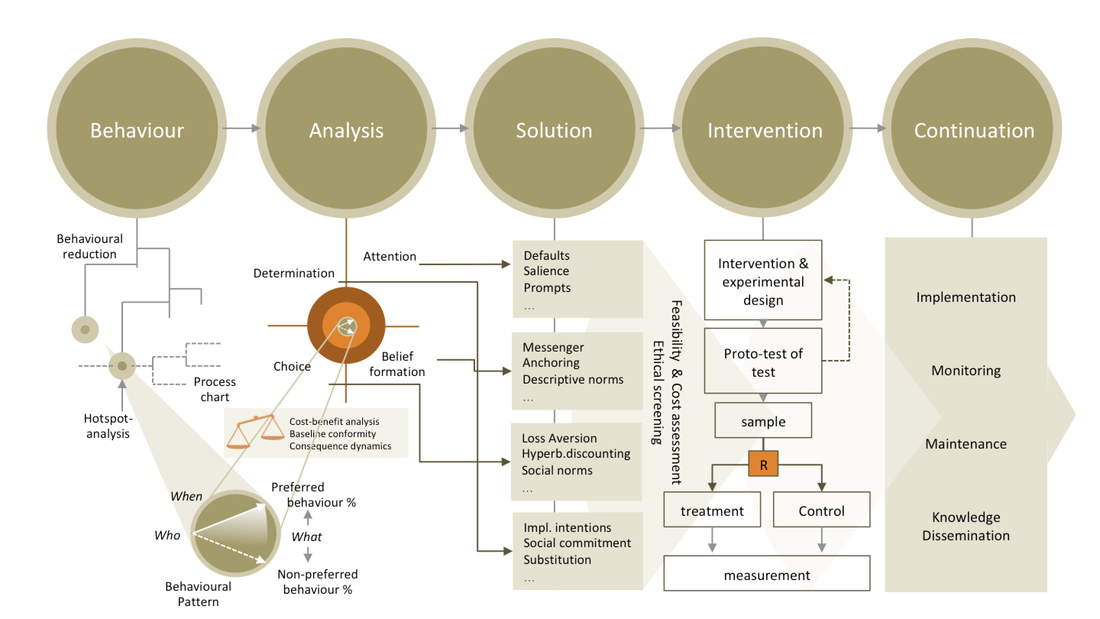|
|
 The application of Behavioural Insights in Public Policy, i.e. Behavioural Public Policy, has definitely come to stay. Reports such as MINDSPACE, EAST and Test, Learn and Adapt as well as the brilliant case collection Behavioural Insights and Public Policy published by the OECD has spurred the interest and motivation of public policy makers and behavioural scientists alike. Little, beyond inspiration, has, however, been written about how to actually apply Behavioural Insights in Public Policy; that is, about the processes, tools and challenges through which a BI-project usually progresses. In particular, almost nothing has been written about how BI-specialists approach a policy issue in behavioural terms as well as identifies suitable Behavioural Insights to apply in order to ensure an effective and responsible policy intervention. To close this gap, Karsten Schmidt and I recently published a new framework for applying behavioural insights in the Journal ‘Politik & Økonomi’. The framework is called BASIC: A Diagnostic Approach to the Development of Behavioural Public Policy and is a result of the almost 10 years of work with Behavioural Insights we have carried out at iNudgeyou – The Applied Behavioural Science Group. What is BASIC? Like EAST and MINDSPACE, BASIC is an acronym. It stands for ‘Behaviour’, ‘Analysis’, ‘Solution’, ‘Intervention’ and ‘Continuation’. BASIC is intended to provide prospective BI-specialists with a detailed framework for developing Behavioural Public Policy from the beginning to the end of a BI-project. It does this by presenting tools for:
BASIC is not only distinguished from earlier frameworks like MINDSPACE and EAST by encompassing the whole process involved in BI-projects. It also distinguishes itself by being diagnostic – a feature captured in BASIC by means of a theoretical framework which systematically relates the ANALYSIS of BEHAVIOR to that of identifying what Behavioural Insights to apply as potential SOLUTIONS. The paper mentioned above is a conceptual paper and therefore mainly accessible to those already quite familiar with applying Behavioural Insights in Public Policy. (In addition it is published in the journal Politik & Økonomi and is thus in Danish). Fortunately, in 2018 a much more comprehensive and detailed version of BASIC, including tools and ethical guidelines, will be made accessible for prospective BI-specialists as part of a toolkit for policy makers that will be developed with and published by the OECD.” UK Abstract Hansen, PG & Schmidt, K 2017, 'BASIC: En diagnostisk tilgang til udviklingen af adfærdsbaseret offentlig politik' Oekonomi og Politik, vol 90, no. 4, p. 40-53. For the past 10 years, we have witnessed the emergence of a new evidence-based policy paradigm, Behavioural Public Policy (BPP), which seeks to integrate theoretical and methodological insights from the behavioural sciences to public policy development. However, the work with BPP has been characterized by being unsystematic as well as centred on best cases, which neither specify the prerequisites for, nor the processes involved in, the development of BPP. This article presents BASIC; a diagnostic approach to integrating theoretical and methodological insights from the behavioural sciences in the development of behavioural public policies, as well as ABCD, which is a model for systematic behavioural analysis, development, test and implementation of behavioural insights. The overall model enables researchers as well as public employees to better understand the phases involved in the development of sound behavioural policies and how relevant behavioural insights are identified as the basis for effective policies. |
 RSS Feed
RSS Feed